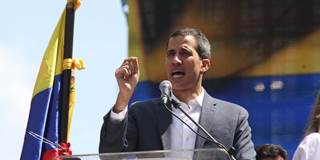Mexico and Uruguay have adopted the two arguments most often repeated by backers of the Venezuelan dictatorship. They sound reasonable at first, yet, after a moment’s reflection, both arguments turn out to be cynical, nonsensical, or both.
LONDON – Nicolás Maduro’s term as president of Venezuela ended on January 10. Following the Venezuelan constitution, Juan Guaidó, head of the democratically elected National Assembly, declared himself interim president. The United States, Canada, and much of South America immediately recognized him as the legitimate leader of Venezuela. Several European Union countries have already done the same.

LONDON – Nicolás Maduro’s term as president of Venezuela ended on January 10. Following the Venezuelan constitution, Juan Guaidó, head of the democratically elected National Assembly, declared himself interim president. The United States, Canada, and much of South America immediately recognized him as the legitimate leader of Venezuela. Several European Union countries have already done the same.